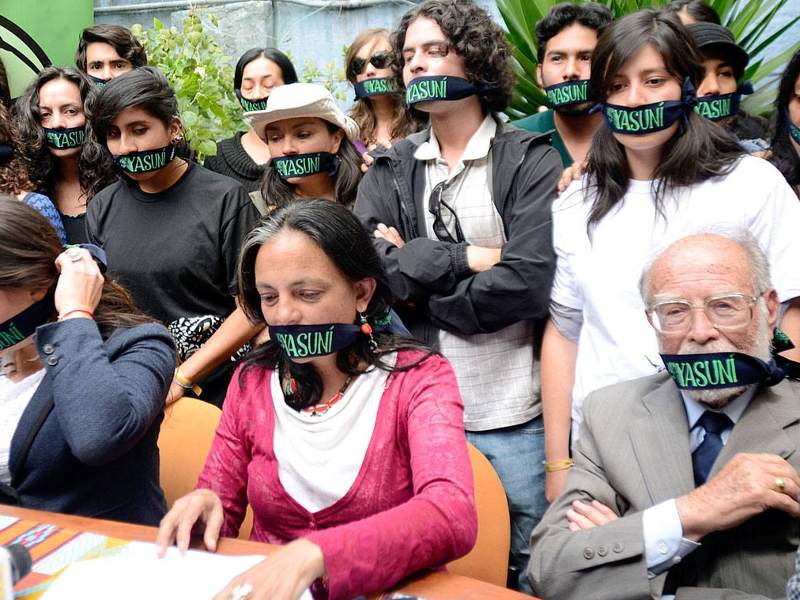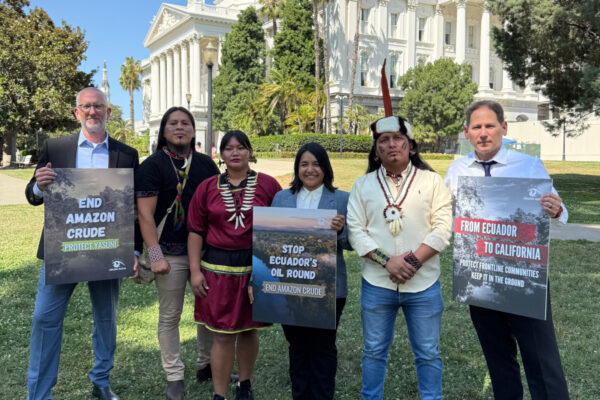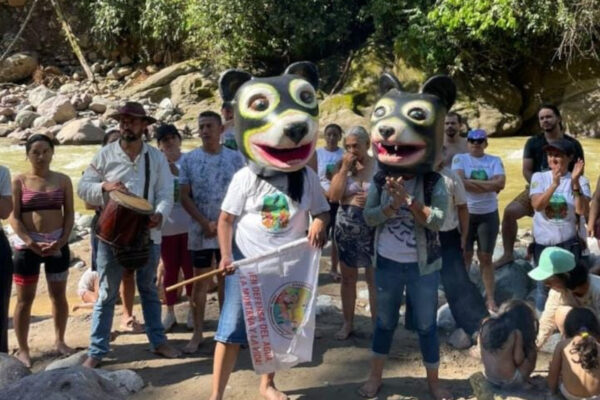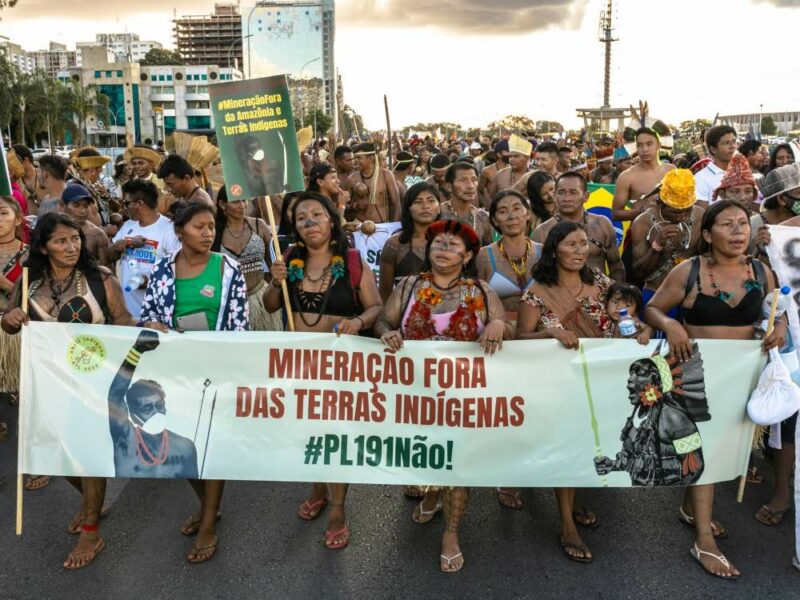
Ecuador became an even more difficult place to be a defender of indigenous rights and the environment in recent days. You would think a country with constitutionally-enshrined protections for Mother Nature would support and encourage indigenous and environmental rights defenders, but sadly that is not the case, and it has implications for the global climate change movement.
On Tuesday, Ecuador’s Environment Ministry announced its intention to shutter Acción Ecológica, the country’s leading grassroots environmental organization and one of the founders of the Keep It In The Ground movement, which has become a global call to support the scientific mandate to keep all remaining fossil fuels in the ground. The government made clear that the move was a direct response to the group’s efforts to raise awareness – like tweeting and posting blogs – about environmental and indigenous rights concerns over a planned copper mega-mine on the lands of the Shuar indigenous people in the southern Ecuadorian Amazon. That very same evening, the national police raided the offices of the Shuar federation, FICSH, and detained its president, Agustín Wachapa, who is still being held.
The Shuar situation about which Acción Ecológica had been sounding the alarm involved the escalation of the conflict between the Shuar community of Nankints, the government, and a Chinese mining conglomerate Explorcobres S.A. (EXSA). The government had granted EXSA rights to mine for copper in the area of San Carlos Panantza, which overlaps with Shuar ancestral territory, without seeking the consent of – let alone properly consulting with – the Shuar, despite the fact that international and Ecuadorian law require such consultation. As the mining project moved forward, the Shuar tried to engage various government entities in dialogue.
Those attempts at dialogue were brutally interrupted in August when military and police forces forcibly evicted Shuar families from land the company needed for the mine. After a lack of adequate response from the government, in late November the Shuar attempted to return to those lands and were met with heavy police and military presence, including air assaults. When the vice president of FICSH tried to mediate, he was arrested. Instead of heading calls from regional and national indigenous federations for mediated dialogue, the government continued its heavy-handed approach, and the conflict escalated. Last week those protests turned violent, resulting in several injuries and the death of one policeman. The government then declared a 30-day “state of emergency” – essentially the suspension of rights and due process – and sent in the military, complete with armored tanks. President Rafael Correa wasted no time in taking to the airwaves and Twitter to defame the Shuar, calling them “semi-delinquents” and implying that they’re using extortion for material gain.
The heightened tensions resulting from the state of emergency have also spilled over into neighboring Amazonian provinces. On Monday, the Kichwa of Sarayaku in Pastaza province, who have publicly declared support for the Shuar and called for dialogue, intercepted eleven soldiers traveling unannounced through their ancestral territory, in order to investigate the soldiers’ presence. After talks with the governor of Pastaza and the brigade commander, the soldiers were peacefully and safely released to Ecuadorian authorities, yet Correa now claims Sarayaku “kidnapped” the soldiers and has fired the governor for negotiating with Sarayaku for their release.
Acción Ecológica isn’t taking the closure attempts lying down, of course, because they – and we – know that they were simply doing the legal and legitimate work the organization was founded to do. “We will continue to defend the rights of both humans and nature,” its members said in a statement after the closure announcement, and they’ve participated in protests in Quito, called national and international allies for support, and publicly defended their actions. “We reject the assertion of the Ministry of the Environment that we have violated national law,” the statement continued, and, in fact, “our actions are in full harmony with [the government’s] National Plan for Good Living 2013-2017,” which calls for participatory management of the country’s environmental treasures like the Amazon.
Acción Ecológica celebrated its 30th anniversary this year, and the group is largely responsible for the country’s modern environmental movement. On issues ranging from resource extraction, climate change, GMOs, deforestation, free trade, ecological debt, and globalization, Acción Ecológica has been an outspoken pioneer in shaping environmental policy and corporate accountability in Ecuador and beyond, as the expressions of support from around the world demonstrate.
The action against Acción Ecológica is not the first time the administration of Rafael Correa has sought to dissolve the organization. In a 2009 attempt to shut it down, the administration similarly argued that the group had veered away from its registered organizational mission. The government had to reverse course after Acción Ecológica provided an abundance of evidence that it was acting in full accord with its mission and Ecuadorian law, and the group received significant national and international support at the time.
Paradoxically, many of the Correa administration’s landmark environmental initiatives actually originated with Acción Ecológica, like the the 2007 Yasuni-ITT initiative, which sought to keep close to a billion barrels of crude in the ground underneath Yasuni National Park in exchange for financial contributions equaling half of the country’s forgone revenue. After Correa pulled the plug on the initiative and approved drilling, the group spearheaded the formation of Yasunidos, a national grassroots collective that gathered over 750,000 signatures to force a vote on drilling plans in Yasuni. And the groundbreaking inclusion of the Rights of Nature in the country’s 2008 Constitution, which constitutionally enshrined the rights of Mother Nature, would not have happened without the organization’s work.
The Correa administration has a history of criminalizing not just Acción Ecológica but many of those who defend indigenous rights and the environment. In 2013 it successfully shut down the environmental organization Fundación Pachamama after it supported a protest denouncing new oil concessions on indigenous lands in the country’s southern Amazon region.
This witch hunt against Acción Ecológica, the heavily militarized response to Shuar protests, and the attempts to criminalize and defame the Shuar and the Kichwa of Sarayaku are all illustrative of the Correa administration’s rollback of rights for civil society and indigenous peoples and unwillingness to engage constructively with criticism of his policies. All of us around the world who stand up for the earth and its people should take notice, and take action to assure such witch hunts end in Ecuador – and don’t start closer to home.













